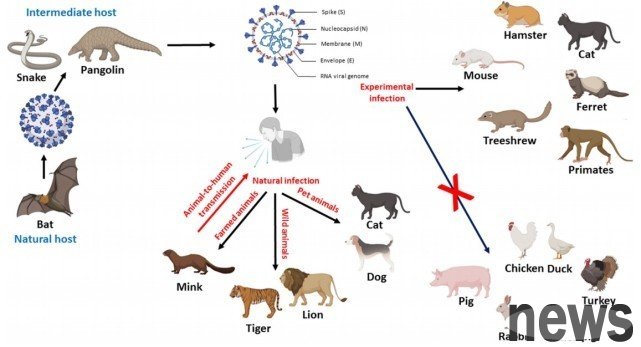Except for minks, no cases of "animal transmission" of the new coronavirus have been found in cats, dogs and other animals. Families with pets can reduce their interactions with strangers by appropriately limiting their pets' range of...
Except for minks, no cases of "animal transmission" of the new coronavirus have been found in cats, dogs and other animals. Families with pets can reduce their interactions with strangers by appropriately limiting their pets' range of movement and reducing the likelihood of their pets being infected or carrying the new coronavirus.
Verified: biokiwi丨Popular life science author

On September 28, the incident of three cats in Harbin being euthanized for nucleic acid positive triggered heated discussions among netizens. In fact, since the outbreak of the new crown pneumonia epidemic, many animals have been reported to have "positive new crown tests", including ferrets, tigers, gorillas, etc., as well as our pet friends - cats and dogs. So what risks will the infection of animals with new coronavirus bring? How can you avoid these risks if you have pets at home?
1. Which animals can the new coronavirus infect? Can it be spread across species?
A study published in the preprint bioRxiv on July 29 pointed out that about one-third of white-tailed deer (Odocoileus virginianus) in the northeastern United States have antibodies against the novel coronavirus (SARS-CoV-2) in their bodies—which means they were or are now infected with the novel coronavirus. Before the white-tailed deer, tigers, orangutans, lions, minks, ferrets, snow leopards, dogs and domestic cats in zoos, farms, and wild environments were reported to have been infected with the new coronavirus. Although it is not yet determined whether bats are natural hosts of the new coronavirus, they are also animals in nature that may be infected by the new coronavirus.
In laboratory environments, hamsters, ferrets and fruit bats will also be infected with the new coronavirus like cats and spread to each other within the same species. In contrast, although dogs are infected with the new coronavirus, they will not cause effective transmission. In addition, in experimental models studying human infection with the new coronavirus, non-human primates such as rhesus monkeys, cynomolgus monkeys, and black long tailed monkeys will also be infected with the new coronavirus and have clinical characteristics similar to humans.

Picture Note: Animals that may be infected with the new coronavirus Image source: Mohamed et al., 2020
There are also some animals, such as pigs, mice, chickens or ducks, etc., which will not be affected by the new coronavirus. Which animals will be infected and which animals will not appear to be elusive. So, what are the main factors that determine the type of host infection of coronavirus?
The answer is actually hidden in the virus.
As a single-strand underlying RNA virus, coronavirus (CoV) is divided into four genera: α-CoV, β-CoV, γ-CoV and δ-CoV. The first two infect mammals, while the latter two will attack birds and pigs. As a new member of the genus β-CoV, the new coronavirus is currently known to be able to infect the mammals mentioned above.
Looking at it more carefully, it is known that the RNA genome of the new coronavirus can encode 16 non-structural proteins and 4 structural proteins. The latter includes the spike protein (Spike protein) not only the source of the name coronavirus, but also plays a key role in the selection of virus host types and infection process. Because the spike protein is combined with the surface receptors of human respiratory tract cells, the new coronavirus can enter cells, replicate, and cause harm to the human body; this is why vaccines and some drugs under development will use spike proteins as target targets.
Since the new coronavirus gene exists in the form of RNA, the probability of mutation is higher than that of DNA. When the gene encoding the spike protein changes, it may enhance the affinity of the virus for cell surface receptors, and may also confer the ability of the virus to bind to other biological cell surface receptors, thereby enabling transmission between different species.
2. There are no cases of cats and dogs infected people. The shovelers do not have to worry too much. Although the backtracking of the transmission chain of the new coronavirus has not been completed, some researchers believe that this virus is similar to SARS and MERS, which are also coronaviruses. It has continuously accumulated mutations and evolution through natural hosts and intermediate hosts, thereby gaining the ability to infect humans, entering the human world, and triggering a global epidemic.
Similarly, if the new coronavirus infects and lurks in other animals in nature, even if humans expel them from the human world through isolation and vaccines, the virus may accumulate new mutations in other animals.
For example, the mink mentioned above has received attention from the World Health Organization and many countries, and many places have carried out large-scale culling of minks. In Denmark, there are also cases where minks in turn infect humans.
Thankfully, the situation where the new coronavirus has been directly infected with humans from animals in minks. There are no cases of infection with cats, dogs and other pets, so friends who have pets at home do not need to worry too much.
3. How should pets be kept to avoid the risks brought by the new coronavirus?
As mentioned earlier, animals such as dogs and domestic cats may also be infected with the new coronavirus, so it is important to protect pets and protect them from the new coronavirus from humans or nature.
For cat owners, they should try to keep their domestic cats indoors and avoid free movement in outdoor areas with many people; while dog owners should be better off walking their dogs in open and fewer places, and reduce the interaction between dogs and strangers, and reduce the possibility of being infected or carrying the new coronavirus.
In addition, it is also very important to regularly clean pets such as bathing, but chemical disinfectants, alcohol, hydrogen peroxide and other products cannot be used to wipe the pet's body directly, because this will cause harm to the pet; pet owners should also regularly observe and record pet discomfort symptoms. If there is a problem, they need to contact a veterinarian or pet hospital in time..
On the other hand, when the pet owner has suspected symptoms, he not only needs to be tested and isolated as soon as possible, but he should also send the pet for the same test and observation to avoid the remaining coronavirus on the pet, causing the recurrence of viral infection.
Editor of this article: ambergchen
Click on the search box of Tencent News APP to view the [Reality List], and the latest rumors to refute science are all in one place every day.
Copyright Statement: This article is a serious copyrighted article by Tencent. Reproduction is prohibited without authorization. Personal forwarding is welcome to your friends and family groups.